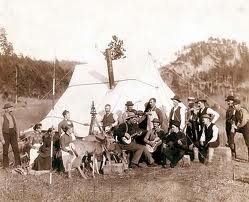There is wide diversity within the Wise Use Movement but members share a dislike of environmental regulations which affect parts of the movement in various ways; by constraining what they can do on private property and how they can use public land and water. Rural people in the US often identify with an individualist and pioneering spirit of self-determination that upholds free enterprise and property rights as sacrosanct and opposes government intervention, even if that intervention is in the public interest:
They proclaim values associated with John Locke, values that impelled the founding fathers. In this tradition, that government is best which governs least. The right to life, liberty, and the pursuit of happiness includes the individual’s right to appropriate wealth from nature. If no one has claimed it, it’s yours. In this view, government’s role is to help convert natural resources into private property, and then to protect that property.
 Ralph Maughan and Douglas Nilson, academics from Idaho State University, suggest that the Wise Use agenda stems from an ideology that combines laissez-faire capitalism with “cultural characteristics of an imagined Old West.” The resulting beliefs include:
Ralph Maughan and Douglas Nilson, academics from Idaho State University, suggest that the Wise Use agenda stems from an ideology that combines laissez-faire capitalism with “cultural characteristics of an imagined Old West.” The resulting beliefs include:
These beliefs blend well with libertarian philosophies and those of other free market proponents, including corporate executives. However the truth is that much economic activity in the West is heavily subsidised by government and doesn’t fit the laissez-faire ideal at all. Nevertheless the articulation of these beliefs helps groups, which are fighting for self-interested reasons, appeal to a wider constituency.  For example, the Blue Ribbon Coalition represents those who want to be free to enjoy the recreational use of off-road vehicles—four wheel drive vehicles and motorbikes etc—in national parks. It campaigns against the Endangered Species Act, which has been used to limit their access to these areas. It’s rhetoric draws heavily on the above laissez-faire/Old West ideology:
For example, the Blue Ribbon Coalition represents those who want to be free to enjoy the recreational use of off-road vehicles—four wheel drive vehicles and motorbikes etc—in national parks. It campaigns against the Endangered Species Act, which has been used to limit their access to these areas. It’s rhetoric draws heavily on the above laissez-faire/Old West ideology:
The Endangered Species Act has failed in large part because it has engendered a regulatory regime that has:
- violated the rights of individuals, particularly property rights;
- destroyed jobs, devalued property, and depressed human enterprise on private and public lands;
- hidden the full cost of conserving endangered species by foisting those costs on private individuals; and
- imposed significant burdens on State, county and local governments.